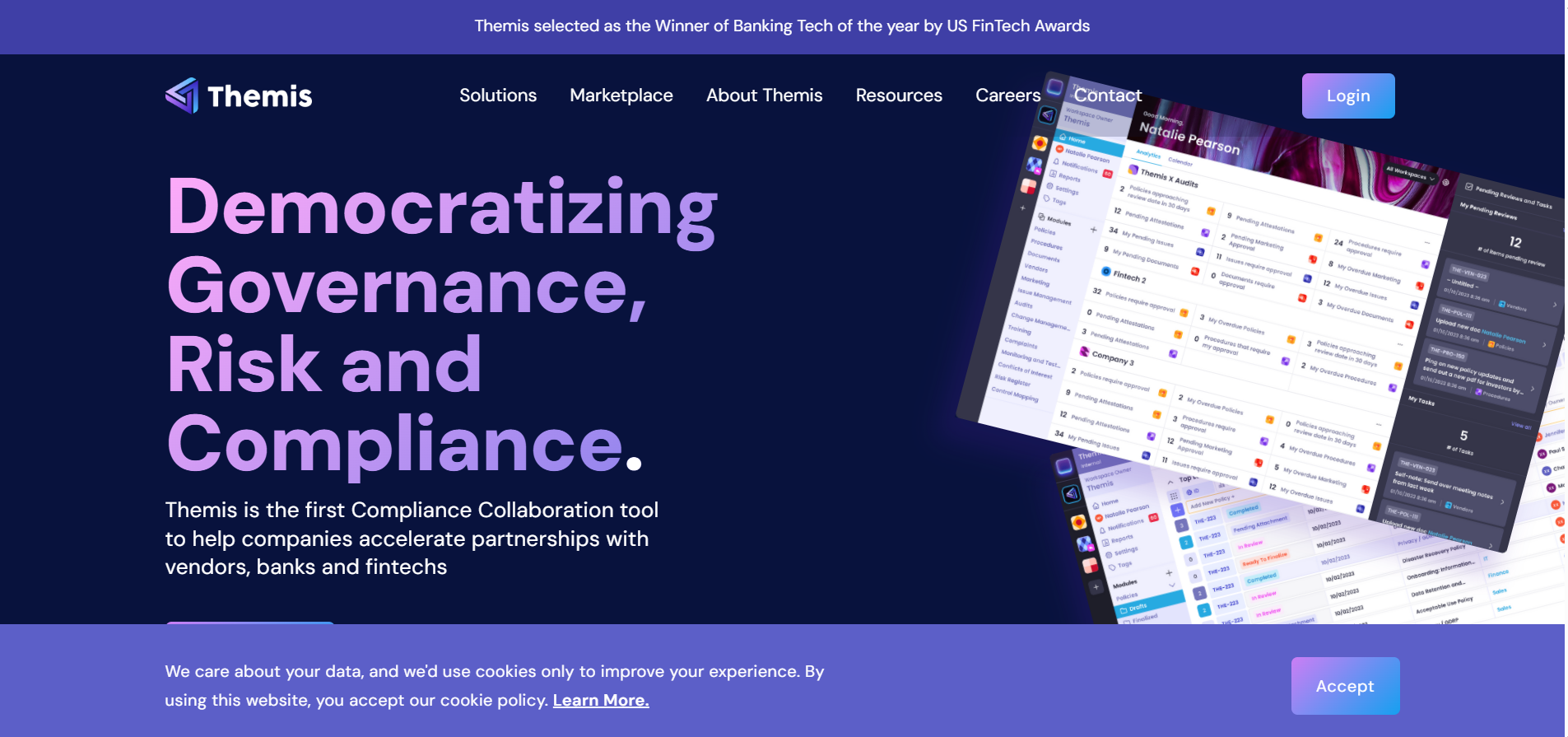Regulatory Compliance Management Applications: Empowering Businesses to Navigate Complex Regulations
Regulatory Compliance Management Applications

In a world of growing regulatory demands, the ability to stay compliant isn’t just about avoiding penalties—it’s a strategic differentiator. Companies across industries are under constant pressure to adhere to ever-evolving rules from financial, healthcare, data privacy, environmental, and labor authorities. Managing this complexity manually or through disconnected systems can lead to errors, inefficiencies, and serious legal consequences. This is where Regulatory Compliance Management Applications come into play.
At Themis, we empower organizations with smart, automated tools that centralize compliance efforts and reduce regulatory risk. Whether you’re operating in a highly regulated space like finance or simply want to ensure your compliance programs are audit-ready, our platform makes it easier to manage, monitor, and prove your compliance with confidence.
What Are Regulatory Compliance Management Applications?
Regulatory Compliance Management Applications are software platforms designed to help organizations monitor, manage, and report on their compliance with relevant laws, regulations, and internal policies. These tools streamline traditionally manual and error-prone tasks such as policy tracking, audit preparation, employee training, and incident reporting.
By digitizing these processes, compliance teams save time, reduce risk, and gain full visibility into where they stand against regulatory requirements. These applications also play a critical role in aligning compliance with broader enterprise risk management and governance strategies.
The Rising Need for Compliance Management Tools
In today’s digital-first, global economy, companies face multiple compliance obligations simultaneously—from data privacy laws like GDPR and CCPA to financial regulations like FINRA 4530, SOX, AML/KYC, and industry-specific mandates.
The challenges include:
-
Rapidly changing regulatory environments
-
Cross-border compliance complexities
-
High volume of documentation and reporting
-
Increased scrutiny from auditors and stakeholders
-
Rising costs of non-compliance (fines, reputational damage)
Without a centralized compliance solution, organizations are often forced to rely on spreadsheets, siloed systems, or outdated processes. This not only slows down operations but increases the likelihood of missing key requirements or failing audits.
Key Features of Regulatory Compliance Management Applications
An effective compliance management solution should offer a robust set of features tailored to modern risk and compliance workflows. Some essential capabilities include:
-
Centralized Regulatory Repository
Keep all applicable laws, regulations, and internal policies in one place—easily searchable and updated in real time. -
Automated Workflows
Automate compliance tasks such as control testing, evidence collection, approvals, and escalations. -
Real-Time Dashboards & Reporting
Get instant visibility into compliance health across departments, business units, or geographic locations. -
Policy Management
Streamline the creation, approval, distribution, and attestation of compliance policies. -
Training & Awareness Modules
Deliver mandatory employee training and track completion to ensure compliance readiness. -
Audit Trail & Evidence Tracking
Maintain detailed records of all compliance activities, essential for audits and internal investigations. -
Issue & Incident Management
Log, track, and resolve non-compliance events with documented corrective actions.
How Themis Helps You Stay Compliant
At Themis, we understand the challenges compliance teams face. Our Regulatory Compliance Management Applications are designed to simplify the complex—offering intuitive dashboards, customizable workflows, and seamless integrations with existing systems.
Our platform supports compliance with a broad array of frameworks, including:
-
FINRA 4530 reporting
-
GDPR and CCPA data privacy requirements
-
SOX internal control management
-
AML/KYC verification workflows
-
ISO 27001, HIPAA, and more
With Themis, you can map regulations to controls, assign responsibilities, monitor risk, and generate audit-ready reports in minutes—not weeks.
Benefits of Using Themis Compliance Tools
1. Reduce Manual Workloads:
Automated reminders, real-time status tracking, and centralized documentation reduce the burden on your compliance team.
2. Increase Audit Readiness:
Built-in audit trails and evidence tracking ensure you’re always prepared for internal and external audits.
3. Enhance Risk Visibility:
Understand how compliance violations may overlap with broader risk categories, including operational, reputational, and financial risk.
4. Align with Business Goals:
Ensure compliance activities are directly contributing to organizational performance, customer trust, and regulatory success.
5. Lower the Cost of Compliance:
By streamlining repetitive tasks and reducing errors, organizations can achieve compliance more cost-effectively.
Who Needs Compliance Management Software?
Organizations across nearly every industry can benefit from Regulatory Compliance Management Applications. This includes:
-
Financial Services – to meet SEC, FINRA, AML, and SOX requirements
-
Healthcare – for HIPAA and data privacy compliance
-
Technology & SaaS – to comply with GDPR, CCPA, ISO 27001
-
Manufacturing – for OSHA, EPA, and ISO 9001 compliance
-
Education & Government – for FERPA and public accountability standards
No matter your industry, Themis offers scalable tools to manage compliance obligations with ease and clarity.
Final Thoughts
As the compliance landscape becomes more demanding and complex, the need for intelligent, automated solutions is undeniable. Regulatory Compliance Management Applications help businesses stay ahead of ever-evolving requirements, minimize risk, and foster a culture of accountability.
At Themis, we’re redefining compliance with tools that are not just functional but transformational. Whether you’re dealing with financial regulations or global privacy standards, our platform empowers your team to stay compliant with confidence.
Ready to streamline your compliance operations? Visit Themis today and discover how our platform can make regulatory compliance simpler, smarter, and more strategic. https://theglobalnewz.com/




